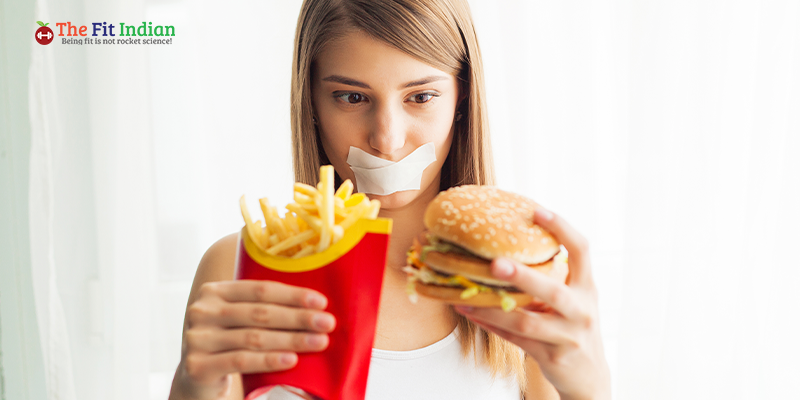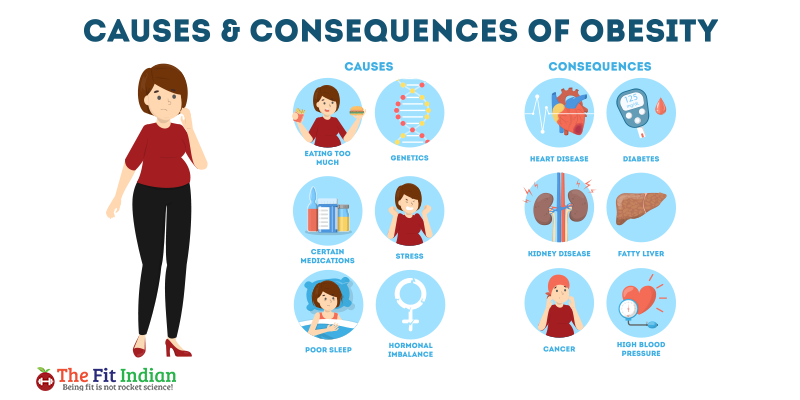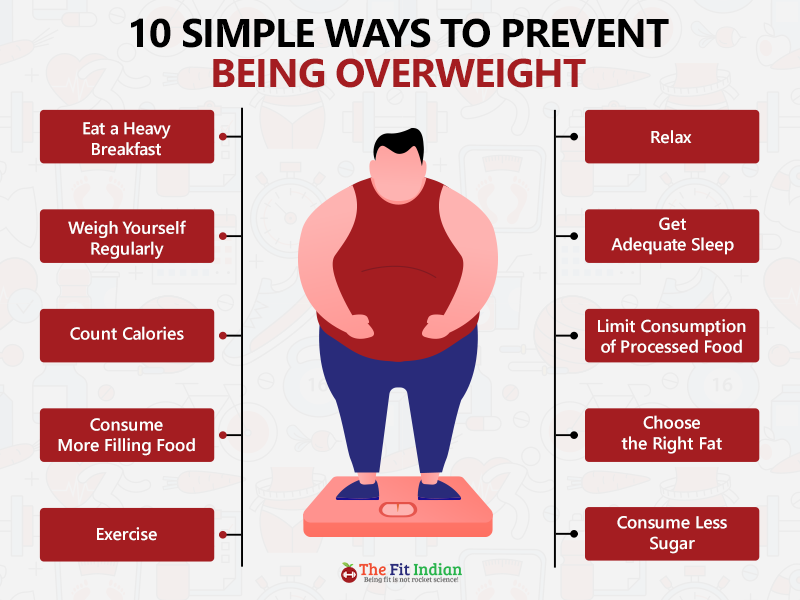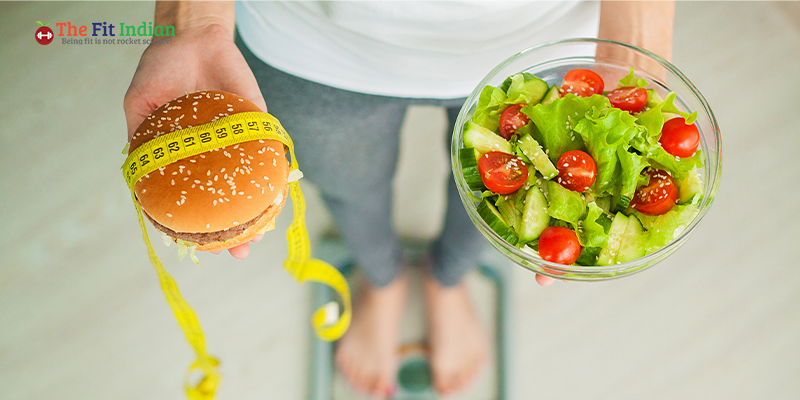10 Most Effective Ways to Prevent Yourself From Being Overweight
| Author: Manoja Kalakanti
This is an issue resulting from a drastic change in lifestyle in the 20th and especially the 21st century. The rise in overweight and obesity has even forced governments to tackle this issue. A cocktail of modern-day habits that involve a sedentary lifestyle and bad dietary patterns are to be blamed. 
The COVID-19 crisis further underlined the importance of maintaining a healthy weight. People who are overweight or obese have experienced more severe symptoms and an even higher risk of death than others. In this article, we will talk about the most effective ways to prevent this condition. But before we delve into the diet and treatment plans, let’s understand what being overweight means.
How do you Define Overweight?
Being overweight means having a weight that is more than the recommended weight. It is an amount of weight that is considered to be unhealthy. This differs from one individual to another. There is no specific weight range that is considered to be healthy. There are a lot of factors that are taken into account. But there is an effective way of measuring the ideal or healthy body weight. Body Mass Index (BMI) determines an individual’s ideal weight based on height and weight. A BMI of 25 to 29.9 is considered overweight. So, what is the difference between this and obesity?
But there is an effective way of measuring the ideal or healthy body weight. Body Mass Index (BMI) determines an individual’s ideal weight based on height and weight. A BMI of 25 to 29.9 is considered overweight. So, what is the difference between this and obesity?
How is it Different from Obesity?
Being overweight may not be ideal, and it does not result in any major health issues. But if not taken care of, it can lead to obesity, a BMI of more than 30. Obesity can cause several severe health problems.
Now that you know what the condition is all about, let’s take a look at the causes and consequences.
Causes and Consequences of Being Overweight
There are many reasons why one can become overweight and eventually be obese. Many of these causes are related to the lifestyle most of us lead today. Being overweight can lead to more severe health problems. So, it is better to prevent it from happening. Apart from physical problems, this condition can also cause psychological complications. The causes of this condition are usually related to our day-to-day activities. A simple change in our habits can bring on an immense change in our health. You can also take help from professionals. You can consult a nutritionist or dietician to help you out with preventing the condition. Let’s take a look at the most common causes that make you overweight.
The causes of this condition are usually related to our day-to-day activities. A simple change in our habits can bring on an immense change in our health. You can also take help from professionals. You can consult a nutritionist or dietician to help you out with preventing the condition. Let’s take a look at the most common causes that make you overweight.
1. Diet
This is perhaps the biggest reason for the rise in overweight and obesity in recent years. Your diet plays a crucial role in determining your health. This condition occurs when the calories you consume are much higher than what you burn. The modern-day diet consists of a lot of processed and junk food that drives unhealthy weight gain. Indulge in a diet to lower BMI (Body Mass Index) in order to manage the condition.
2. Sedentary Lifestyle
This factor is connected to diet. If you consume a lot of calories and do not burn them, you tend to become overweight. Leading a sedentary lifestyle results in minimal burning of calories.
3. Age and Gender
As you grow older, you tend to gain more fat, especially around the waist. As far as gender is concerned, hormonal factors play a key role in weight gain in women during menopause. Being overweight or obese is not limited to adults, even children are facing this issue today. There’s no need to panic, there are plenty of solutions to childhood obesity.
4. Genetic
Genes can make a person more susceptible to becoming overweight. But other factors such as lack of exercise and unhealthy eating habits have an impact too.
5. Health Conditions and Medication
There are certain medicines that are known to cause obesity. Some health conditions such as Polycystic Ovary Syndrome (PCOS) and an underactive thyroid can also result in weight gain.
6. Stress and Emotional Issues and Sleep
These are some of the other factors that cause overweight problems. The emotional state of an individual has a direct impact on their eating habits. People tend to eat more when they are sad or stressed. Sleep releases hormones that control appetite. And a lack of sleep results in the body requiring more energy through food. This increases appetite and, therefore, weight gain.
Consequences
Being overweight is more than just unhealthy weight gain. This condition could result in obesity and soon cause other much more sinister health problems such as:
- Obesity
- Type 2 Diabetes
- Heart Diseases
- Infertility
- Hypertension
- Osteoarthritis
The modern-day lifestyle has made these causes more prominent than before. But none of these should seem intimidating enough for you to feel overwhelmed. Consistent effort and a little help from professionals can make your weight loss journey much easier. It is crucial to do so since being overweight can lead to more severe problems. Let’s take a look at some of the most effective ways to tackle the issue.
10 Simple Ways to Prevent Being Overweight
“Prevention is better than cure” is a time-tested adage that may seem cliche but still holds. Preventing yourself from being overweight or preventing obesity takes a lot of dedication and consistency. But it isn’t as tricky a task as some people make it out to be.  Follow these simple steps to keep unhealthy weight gain at arm’s length. These rules can also apply to individuals who are already overweight.
Follow these simple steps to keep unhealthy weight gain at arm’s length. These rules can also apply to individuals who are already overweight.
1. Eat a Heavy Breakfast
This one is as simple as it gets. Eat a breakfast that is fit for kings. Devouring a big meal first thing in the morning fills you up and provides a satiating effect. You don’t feel hungry for most of the day. This prevents you from indulging in unhealthy snacks. But it is important that you eat a healthy breakfast; otherwise, it defeats the whole purpose.
2. Weigh Yourself Regularly
If you are on a weight loss journey, then you must have a specific goal in mind. By regularly checking your weight, you can check if you are close to that goal or not; this will help you calculate your dietary and workout efficacy. Not seeing any improvements may motivate you to work harder, while even a little progress will make you eager to continue with the plan. You’ll also get an idea of your BMI score through a weight check. The healthy BMI for both men and women is between 18.5 – 24.9.
3. Count Calories
Since weight gain is directly related to the calories consumed to the calories burnt, this is probably the most crucial factor in your weight loss journey. Keep a count of your daily calorie intake, and you’ll get a clear picture of the changes you need to make in your diet and workout regimen, if any.
4. Consume More Filling Food
Foods such as potatoes, high-fibre food, nuts and eggs are considered to be filling. They reduce your appetite as they have a satiating effect. This will prevent you from snacking on unhealthy food.
5. Exercise
Exercising helps you burn calories, and that is the most vital aspect of a weight loss plan. Even if you consume high amounts of calories, your weight can be under control if you can burn them efficiently. A sedentary lifestyle is one of the leading causes of overweight and obesity. This is also a fun and easy way to lose weight since any physical activity like dancing, running, yoga, weight training and even walking is effective.
6. Relax
Stress releases Cortisol, which is a “stress hormone”. Cortisol causes an increase in appetite, which makes you eat more. So relax a little, engage in fun activities, deep breathing practice or meditation to release stress.
7. Get Adequate Sleep
A good night’s sleep releases hormones that keep your appetite under control. On the other hand, a lack of sleep will make your body tired and in need of energy through food. Hence, sleep can help you control your food cravings and thereby control weight gain.
8. Limit Consumption of Processed Food
Processed foods such as cereals, bread and packaged snacks are a rage and have become part of our daily diet. The primary reason for this is the affordability and convenient nature of these foods. They also taste good. But these foods are refined, contain harmful ingredients and lack an essential amount of nutrients. And to make matters worse, they are also high in calories. Coupled with a sedentary lifestyle, this has turned out to be one of the biggest culprits of weight gain. To counter this, replace these foods with healthy alternatives that are also delicious.
9. Choose the Right Fat
Not all fats are bad, unlike what some people like to claim. Consume “good” or unsaturated fat while avoiding “trans” fat. Good fats include oils, nuts, seeds and fish. Bad fats are usually found in processed foods.
10. Consume Less Sugar
Sugar is everywhere! We add it in our beverages, desserts and it is also present in many packaged foods. Sugar offers no nutritional benefit and leads to elevated sugar levels, which leads to weight gain. So, limit sugar consumption and replace it with healthier alternatives.
Now that you know the best ways to tackle being overweight, let’s look at the diet plan.
Diet Plan
The central role of diet in preventing and treating weight-related problems is undeniable. A diet for the overweight and a proper exercise plan are the most effective ways to prevent this condition. Follow this simple diet plan to manage your weight or to lose some. This is a healthy and complete diet that will keep you fit and prevent weight issues.
Follow this simple diet plan to manage your weight or to lose some. This is a healthy and complete diet that will keep you fit and prevent weight issues.
- Early morning : Lukewarm water with Lemon and Ginger (1 glass)
2 soaked Walnuts and 2 Anjeer
- Breakfast : 1 bowl of Oats porridge
or
Brown Bread Corn Sandwich – 1 Sandwich and have half cup of toned Milk
or
Vegetable Poha with sprouts 1 cup
- Morning snack: Half cup Pomegranates or 2 Kiwi
Any Herbal Tea – 1 cup
- Lunch : Cucumber and Radish Salad (1 bowl)
Boiled Brown Rice (1 cup) or Quinoa Khichdi (1 cup)
Rajma Masala or Red Gram Dal (1 cup)
Curd (Half katori)
- Evening snack: Roasted Makhanas (1 cup)
Cumin seeds water (1 glass)
- Dinner : Methi ki Roti – 1 Roti with Grilled Fish/Chicken (1 steak)
with Cauliflower Curry or Dal (Half cup)
or
1 Multigrain Chapati with Dal or Green Subzi (1 cup)
Note: Avoid sweets, sugary drinks, excess salt, deep fried foods, maida, white bread, soft drinks, junk foods, and red meat.
- Drink a minimum of 3 liters of water per day
- Engage in physical activity for around an hour
It takes more than just a good diet to lose or manage weight. While a good diet makes a lot of positive difference, you need to exercise regularly, sleep well and lead a stress-free life to maintain a healthy weight. You can consult a nutritionist for a more detailed and customized diet plan.
Takeaway
The cases of people gaining unhealthy amounts of weight are on the rise. While being overweight may not cause any problems of its own, it may lead to obesity if not controlled. And obesity can cause many deadly diseases. So, it is time you take your diet and exercise habits a little bit more seriously. With the right diet plan and regular exercise, you can prevent this condition and stay fit and healthy.
FAQ’s
1. How do I stop being overweight?
It is not a difficult task to prevent being overweight or treating the condition. There are some challenges, but the goal is achievable. All you need to do is make some lifestyle changes. Exercise more often and follow a healthy diet by cutting out unhealthy foods and consuming more healthy foods. You should also try to lead a stress-free life with adequate sleep.
2. How can I go from overweight to normal?
Some lifestyle changes are needed for you to go from overweight to normal. You can limit the amount of time spent in front of screens, be more active, cut down on junk and processed foods, and eat more healthy foods. You can also follow a proper diet plan, exercise regimen and count your calorie intake.
3. Can obesity be cured?
Yes, obesity can be cured. You can treat this condition by regularly exercising, joining fitness programmes, eating healthy and getting help from nutritionists in order to do so. Other lifestyle changes such as getting adequate sleep and trying to reduce stress are some other ways through which you can treat obesity.
4. What exercise is best for obesity?
It doesn’t matter what kind of exercise you engage in; ultimately, what matters is that you stay active and do not lead a primarily sedentary life. Any exercise such as walking, running, swimming, yoga, dancing and weight training is helpful. It depends on your requirement, ability and interest. It is also important to keep track of your calorie intake and diet.
5. Can stress make you fat?
Yes, stress can make you fat. Stress results in an elevated level of Cortisol which is a “stress hormone”. Cortisol stimulates appetite, which in turn results in weight gain.
6. What foods are best during dieting?
There are many foods that can help in weight loss and therefore must be had during dieting. It’s best to get a detailed plan from a nutritionist or dietician. Foods such as green leafy vegetables, salmon, tuna, fruit, nuts, whole grains, avocados and seeds are considered best during dieting.
7. What foods reduce obesity?
Foods that are natural and not processed, low in sugar and whole, are considered to be best for reducing obesity. Foods such as fruits, vegetables, nuts, whole grains and fish are advised.
8. What are the side effects of being overweight?
Being overweight or obese can impact the quality of life and result in several side effects, some deadly. Unhealthy weight can result in conditions such as diabetes, hypertension, heart disease and stroke.
9. What qualifies you as overweight?
The BMI (Body mass index) is considered to be an indicator of being overweight. You are considered to be overweight if your BMI is between 25 to 29.9.
10. How can I reduce my stomach fat?
To reduce stomach fat, you must cut down on sugar, trans fat and processed food. You should instead consume a lot of fibre, protein and regularly exercise.




Manoja Kalakanti